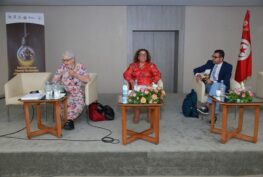Report of the public launch of the Action, 19 September 2017, Tunis.
The second session was a round table on the vision of human rights and terrorism the facilitator of the session Mr. Ziad Krishan Editor in chief of the newspaper Al-Maghrib.
Interventionists Ladies and Gentlemen:
- Boshra Belhadj Hamida a lawyer and a member of the People’s Assembly.
- Laila Al-Hamrouni a parliamentarian and coordinator of the network of parliamentarians to abolish the death penalty.
- Youssef Siddik Researcher and philosopher.
- Chokri Latif, head of the Tunisian Coalition Against the Death Penalty.
- Abdel Basset Ben Hassan, President of the Arab Institute for Human Rights.
The debate was over the first question raised by the facilitator which was: Is it possible to defend the abolition of the death penalty in a society where violence and crime are increasing and the most heinous acts of terrorism are committed?
In response to this question, the answers were consecutively:
Professor Bochra Belhadj Hamida referred to the first struggle against the death penalty in the 1980s following the sentence of 10 young men to death. Although the human rights movement supporting this option after the Tunisian revolution has been demonized by many parties, it is possible to continue the struggle by adopting two basic aspects of the perpetrators Terrorism and those involved in its crimes, which are poverty and marginalization. It is the person who has experienced violence within his family and in the social environment that commits often murder. Moreover, they do not have the ability to spend money to pursue cases and make maximum efforts to ease sentences.
Professor Yousef Al-Siddiq said that he does not distinguish between “elegant” crimes and heinous crimes, and he does not believe in the necessity to arrange crimes according to categories. The professor explains the desire of public opinion to retaliate against criminals by saying, “The punishment that most Muslims consider to be an order in the Quran which life must be regulated upon .” This is a misunderstanding of saying of retribution because it is directed at the Children of Israel (God’s chosen people) to preserve the small group in which they lived. As for the Muslims, it has developed with them and the Qur’anic text included a new term, “Al-diyyah”. This allows for a new interpretation to judge the murderer by paying money to compensate for committing a new crime and extracting life from a second person. This is in the appreciation of the professor to preserve the right to life from a religious angle and diligence that can overcome the phrase “setting the limit”.
Professor Chokri Latif pointed out that the reasons for advocating the abolition of the death penalty are not fixed and are not valid for all times and places. Several arguments can be adapted according to historical circumstances. Regretfully many believe that the harshness of the sentences against the perpetrators of terrorist crimes is the solution to reducing them, so that the rise of terrorism is a pretext for the increase in the number of those sentenced to death. But the events proved the failure of this policy. The execution of 20 people in Chad from the Bukuharam group did not discourage this organization from continuing its criminal activities and the same to resist terrorists in Iraq. Therefore, the solution is not to apply the death penalty to perpetrators of murder, but to eliminate the causes of terrorism and crime is the solution. Tunisia, which has a history of legislation supporting human rights such as the abolition of slavery and the Personal Status Code, will be able in the future to abolish the death penalty despite the setbacks that occurred with the enactment of the Anti-Terrorism Act.
Question by Mr. Ziad Krishan: The People’s Assembly, which includes a group of progressives, have they responded to the abolition of the death penalty?
Professor Laila Al-Hamrouni: The issue is related to the concept of the modern state. Despite the terrorist crimes in Western countries, there have been no voices calling for a return to the death penalty and the legislation of extracting life by a state institution. The state has a duty to protect its citizens, whatever their actions. And that’s a fundamental matter can not be changed by conditions.
Mr. Abdelbaset Ben Hassan The views on complex issues like this can not be determined. In this area, we have not produced sufficient knowledge to support this orientation. However, the Arab Institute for Human Rights has made important steps, notably:
The signing of the Tunisian Covenant of Rights and Freedoms; the hearing of a death sentence that later appeared innocent and this person came to the clubs of citizenship and his story was a factor to change the minds of pupils. Therefore, what is lacking in the movement against the death penalty is a pedagogy that conducts dialogue, revisits the penal system and its develop throughout history, and seeks collective solutions to the multiple possibilities of the dilemma of terrorism and the transformation of human rights into a collective affair so that people stop the demonization of human rights and consider the issue of rights concerns an isolated elite.
Question by Ziad Krishan: How do we convince Tunisians that abolishing the death penalty does not lead to negative resistance to terrorism and that is not lenient with terrorist crime?
Yousef Al-Siddik: The question can be answered in two ways. The first is that no one has the right to take away another person’s life, whatever the crime he committed. The second flip is that our society lives in a fairy mindset and beliefs which needs to be reviewed. This orientation must be supported. The second aspect relates to the concept of limiting the application of the death penalty.
Laila Al-Hamrouni: The council has two languages: public language, the language of cafes and galleries. The debates in the committees are usually calm and thoughtful, but the language in public meetings changes and becomes more influenced by the authority of public opinion. In general, there are a number of abolitionists in every block and enthusiasts of the idea. And an important percentage remained antagonistic and respectful.
Question by Mr. Ziad Krishan: Which generation is opposing the abolition of the death penalty. Is it the 1970s or the new generation?
Mr. Chokri Latif: Betting is on young people and the model of participation of civic education clubs is the best proof of that. It is necessary to focus the work in the educational institutions at all levels because a proportion of the seventies generation rebuffed the struggle for the culture of human rights narrow accounts and interests.
Professor Boshra Belhadj Hamida: Spoke about the Committee of Rights and Freedoms: She pointed out that her committee addressed the issue of equality and has not yet been subjected to the issue of individual rights, the Committee will meet with several parties to develop ideas on individual rights so as to include the question of the abolition of the death penalty as an individual right. As for the restraining policy, it is in its traditional form and nothing has changed so far. The issue of sanctions is an issue that has not been reformed to keep pace with global developments.
Mr. Abdel Basset Ben Hassan: An answer to the question of the comparison between the forms of dealing with the systems with the link between the issue of the right to life and issues of asylum and disabled and marginalized and the role of the Institute and organizations is to open a dialogue in all these issues to answer the question of which society we want and which penal system we adopt and this makes us active to get out from easy solutions, intellectual laziness and courage to ensure all people without exception. This brings us out of the cycle of reproduction of violence and investment in human beings for a comprehensive development that requires allocation of credits to invest in education and in the culture of life.
Professor Chokri Latif and Ms. Laila Al-Hamrouni presented comparative data between countries that abolished the death penalty from their laws and dealt with the phenomenon of terrorism by pursuing a multidimensional strategy aimed at eliminating the causes of violence and autocratic countries that practice the application of the death penalty.
Mustafa Sheikh Zouali: Media does not play its role properly in supporting the culture of human rights due to the dominance of anti-human rights culture. The establishment of dialogue workshops changes attitudes and have been tried with groups of young people with whom dialogue was held.
Professor Nicolas Baroun of “Together against the Death Penalty” referred to the case of Maher El Mannai, who was sentenced to death in Tunisia and found to have proved evidence of his innocence after 10 years in the corridors of death. This case alone is sufficient to provide conclusive evidence that in many cases the death sentence is unjust and many families have been destroyed due to it.
Farida Ben Alaia from the General Administration for Reform and Prisons, provided a platform for those sentenced to death and the positive developments that took place for the benefit of this group. It also showed that those sentenced to death or life are usually characterized by a difficult and aggressive mood, this corresponds to limited possibilities and inadequate infrastructure to carry out actions that would reduce the severity of situation of those convicted in terrorist cases. In this regard, we need the assistance of organizations and several bodies to improve the situation of this category of prisoners.
The intervention of a pro-psychologist focused on the animal aspect of human behavior fueled by aggressive predatory animalism. In order to get out of this situation, efforts must be made by humanity to overcome this situation as humanity has made great efforts to get rid of slavery. The same thing happened with the treatment of humanity with the “insane” and the mentally retarded, who were considered for a long time below the human rank, the group and the laws were excluding and isolating them and subjected them to torture with all aggressiveness and brutality, and efforts and scientific revolution were necessary to get out of this brutal representation and consider them patients in need for special surrounding and care that preserve their dignity and ease their illness. The abolition of the death penalty also calls for similar efforts to break out of the cycle of brutal provisions that undermine the right to life, to address educational reform that limits the causes of crime and terrorism and goes beyond animal cruelty with criminals to humanitarian dealings with them.
Prof. Mustafa Al-Atri: Education is better than cutting heads.
Brigadier Adel Sindid of the General Administration of Prisons and Reform said that he was pleased to attend this meeting and offered his experience in accompanying prisoners who are sentenced to death and not executed. They need a lot of care and attention, which is very tiring for workers in the General Administration of Prisons and Reform. This administration is open to cooperation for the development of the prison system.
Responses:
Mr. Chokri Latif referred to the efforts made in cultural dealing with the prisoners by presenting the coalition experience with prisoners in Mahdia and Al Roumi Tower in Bizerte.
Mr. Abdelbaset Ben Hassan: Referred to the Institute’s experience in the field of prisons in the Arab region, and considered the readiness of the General Administration of Prisons and Reform as a sign of the success of this day and it opens the way for future joint activities to come.
The session ended with a valuable statement addressing this issue and the periodic revival of the date of 10 October in support of the movement against the death penalty.










No Comments